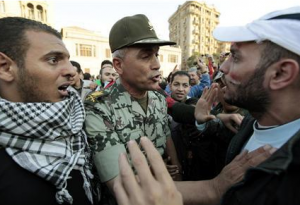By Daniel N.
Last week, a ranking SCAF official held a highly unusual press conference exclusively with foreign correspondents. In what was widely perceived to be a message to the West, the official called the recent election results into question and stated that the SCAF would maintain oversight over the drafting of a future constitution.
While less than one month ago the same issue sparked mass demonstrations, Islamists groups including the Muslim Brotherhood have remained largely silent in the face of these provocative statements. The SCAF now has a window of opportunity to press ahead with efforts to secure its influence in a future constitution, leaving Islamists with the choice of disrupting the election process or allowing the promise of an Islamist Egypt to slip from their grasp.

Ever since the March 2011 constitutional referendum, the SCAF’s insistence on influencing the makeup of the future constitution has fueled tensions in the country, most recently with Egypt’s powerful Islamist factions. This tension came to a boiling point in November, when the SCAF-backed Sharaf government refused to give ground on the implementation of “Supra-Constitutional Principles”, sparking mass protests by the Muslim Brotherhood, which eventually evolved into the nationwide unrest which nearly compromised parliamentary elections. These principles, which would have effectively implanted boundaries on the power of any future Islamist-led parliament, have until now remained the SCAF’s tool to ensure Egypt as a secular state, as well as autonomy in deciding the military budget.
The results of the first round of parliamentary elections has however, reignited fears both within Egypt and around the world of the possibility of an Islamist takeover, with both moderate and Salafist parties garnering 60% of the vote. As the second and third rounds of elections scheduled to take place in rural areas of Egypt, there is a high likelihood that these parties will only secure more and more seats in the future parliament. Liberal parties who once opposed the SCAF’s encroachment on Egypt’s future governance, now find themselves marginalized with the realization that the military is now the best chance they have at securing a secular and democratic future for Egypt. In addition, the prospect of an Islamist victory may also have swayed the West, which just three weeks ago joined protesters in Tahrir Square in calls for a transition of power to a civilian government.
With more than one month to go before the official end of Parliamentary elections, the SCAF has a considerable time frame to secure its influence on the constitution before an Islamist-dominated parliament can take power. The recent establishment of the “Advisory Council” is one such option. This SCAF-appointed civilian body may be given oversight over choosing a 100-member constituent assembly which will draft a constitution before an Islamist-led parliament comes to power. The chatter over the advisory council has already sparked controversy, most notably when the Muslim Brotherhood rescinded its participation in protest over the body’s influence over the future constitution.
The Brotherhood has since limited its actions in opposing the SCAF to boycotting the advisory council, even issuing a statement that it does not seek a conflict with the military. This subtle form of protest suggests that the Brotherhood has much to lose from creating political turmoil at a time when the country has just breathed a sigh of relief over the peaceful polling period. Even when the last wave of unrest turned violent, the Brotherhood refused to continue participating, fearing that the instability could compromise the first round of elections.
The SCAF can therefore capitalize on the newfound fears of Egyptian liberals over an Islamist takeover, using its remaining political tools to implement a future constitution before a Brotherhood-led parliament can enter into power. The Brotherhood’s non-threatening behavior during the current elections suggests that is still views parliamentary elections as the most favorable way to rise to power. Indeed, resorting to unrest and risking a civil war goes against their sought-after image as a compromising and patient Islamist movement. Despite their conflicting statements and mutual fears for renewed unrest, it remains clear that both the SCAF and the Islamists remain unwilling to compromise their influence over Egypt’s future constitution. With Egypt’s future as a liberal or Islamist state hanging in the balance- who will blink first?
Read more about Max Security’s intelligence reports here.